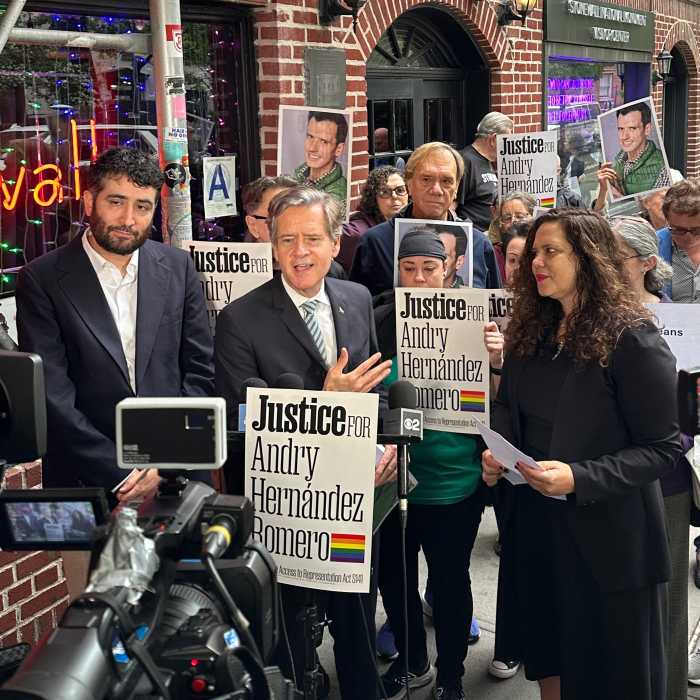BY DOUG IRELAND | The scheduled February 26 extradition of Mehdi Kazemi, a 19-year-old gay Iranian student, from the Netherlands to the United Kingdom, from where he will almost definitely be deported to his homeland, has been put off pending a Dutch court hearing on March 3.
Kazemi fears that he could be executed by Tehran's theocracy, which in 2006 executed the lad who had been his lover.
Homosexuality remains a capital crime in Iran.
Gay teen whose lover was executed faces deportation by UK.
Kazemi fled to the Netherlands after the UK government of Prime Minister Gordon Brown ordered his deportation. It was only a last-minute legal appeal that postponed his return to Britain.
Kazemi, who at press time was in a Rotterdam detention center, is believed to still be on a hunger strike he began more than a week ago. He “is in a very depressive mood and had to be put on a suicide watch” by Dutch authorities, Kazemi's uncle, Saeed, a naturalized British citizen, said in a telephone call to Omar Kuddus of the UK-based group Gay Asylum, which has been campaigning on his behalf.
Andy Harley, editor of UK Gay News, told this reporter, “The is no doubt in my mind that the UK will immediately return him to Iran. Too many MPs have been given assurances by the Home Office” to that effect.
Kazemi detailed his story in an email to the Iranian Queer Organization.
“I used to have a male partner whom I used to meet secretly,” Kazemi related in the email. “I was 15 years old when I started dating one of my classmates in school. His name was Parham.
“We used to meet every day in school and sometimes outside school in cinema or park. We started having sex about eight months after dating each other. We used to meet either in his house or my house when there was no one around.
“No one knew about our relationship. Everyone believed that we were best friends and nothing more than that. My parents knew him as I used to spend a lot of time with him. We were very scared of our relationship. But I had strong feelings toward him and could not stop meeting him. We had decided to keep our relationship a secret… as I knew that if any one from the government had found out about our relationship we would be executed.
“When my father decided that I must study in the UK, I was sad that I was leaving Parham behind in Iran. We used to email each other almost once a week. He used to tell me that the situation in Iran is getting worse and worse and there is more restriction on people… We missed each other a lot and I wanted to return [to] Iran at the end of my studies.”
But Parham's emails abruptly stopped, Kazemi explained.
“Toward the end of March 2006, my uncle in the UK called me and informed me… that Parham was arrested by the authorities in Iran and he had mentioned my name to the government,” he wrote. “The authorities had been to my father's house looking for me and my father was very shocked and scared about the whole situation. My uncle is an open-minded man and has lived in the UK most of his life and was not angry with me about these issues, as I had expected him to be. However, he informed me that my father was very angry with me and had informed my uncle that I must return to Iran as he wanted to beat me up.
“Later that day my father called me and was very angry with me. He shouted at me on the phone and told me to return Iran as soon as possible. I did not say anything to him and just hung up the phone, as I was very scared of him. I continued my studies but had a lot of tension in my mind. I was thinking about Parham. I was very sad and scared for my life…
“About the end of April 2006, my uncle called me again and informed me that my father had informed him that the authorities had executed Parham and that I must not return to Iran, as the authorities would do the same to me. My uncle told me that this time my father was very scared… I asked my uncle how the authorities found out that Parham's homosexual. [He] told me Parham was caught with another guy and was arrested. He was interrogated and asked to tell the authorities about all the men that he had relationships with and he had mentioned my name… Parham was charged with [the] crime of being homosexual and was executed.
“The Iranian authorities have found out that I am a homosexual and they are looking for me. I cannot stop my attraction toward men. This is something I will have to live with the rest of my life. I was born with this feeling and cannot change this fact, but it is unfortunate that I cannot express my feeling in Iran. If I return to Iran I will be arrested and executed like Parham.”
Last spring, Kazemi's student visa to the UK expired, and a Home Office tribunal dismissed his appeal against deportation. The European Commission, in a January 31 statement, wrote, “Member states cannot expel or refuse refugee status to homosexual persons without taking into account their sexual preferences, the information relevant to the situation in their country of origin, including the laws and ways in which they are applied.”
The day before Kazemi's scheduled extradition from the Netherlands, Baroness Sarah Ludford, a Liberal Democrat member of the European Parliament wrote on Kazemi's behalf to British Home Secretary Jacqui Smith, who sought Kazemi's extradition from the Netherlands so that he could be deported to Iran.
“Jacqui Smith must recognize and act on the real threat of persecution and even execution which Mr. Mehdi Kazemi would face if he was to be deported to Iran,” Ludford wrote.
The Italian-based human rights group EveryOne, which launched a petition campaign against Kazemi's deportation and held a demonstration outside the British Embassy in Rome, said in a statement, “We are asking the European Union to adopt a tough stance and overrule the decision taken by Gordon Brown's government. The United Kingdom is continuing undaunted to violate the international conventions on human rights and the rights of refugees as well as the European directives and laws which determine the requests for political asylum.”
EveryOne is making an official appeal to both the European Union and the UN High Commissioner for Refugees, Antonio Guterres, to immediately halt Kazemi's deportation and insure he is given refugee status.
Kazemi was due to have been flown back to the UK on a British Midlands flight. The chairman of British Midlands is Sir Michael Bishop, regularly featured in the annual list of the UK's top openly gay businessmen published by the British daily The Independent. A British Midlands subsidiary also operates the London-to-Tehran route recently abandoned by British Airways.
The online petition for Mehdi Kazemi, which can be signed at the bottom, is at http://www.ipetitions.com/petition/UKMADHI/. The Iranian Queer Organization's website is www.irqo.net. The website for Italy's Gruppo EveryOne is http://everyonegroup.com. Doug Ireland can be reached through his blog, DIRELAND, at http://direland.typepad.com/direland/.


































